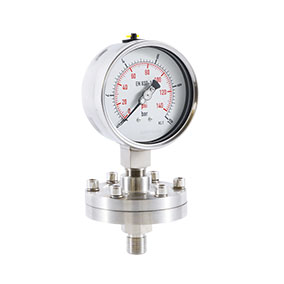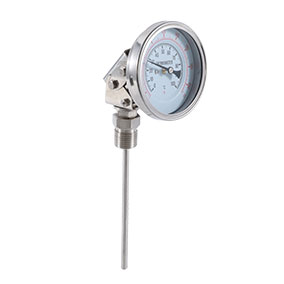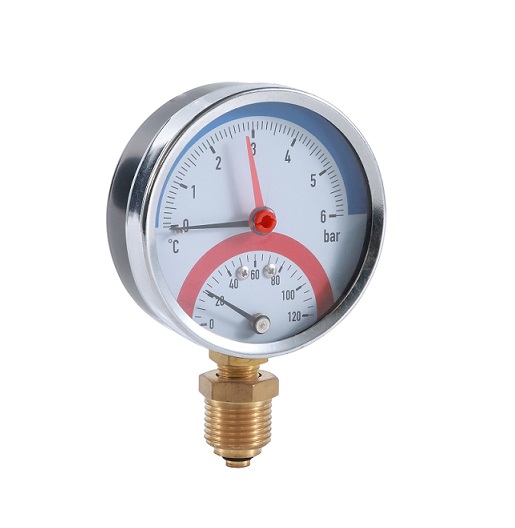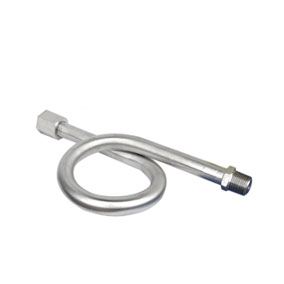Una guía completa sobre los tipos de manómetros
A manómetro Es un dispositivo que se utiliza para medir la presión de gases o líquidos dentro de un sistema. Los manómetros son fundamentales en muchas industrias, desde la fabricación y la calefacción, ventilación y aire acondicionado hasta el petróleo y el gas, los productos químicos y los productos farmacéuticos. Vienen en una variedad de tipos y diseños, cada uno adecuado para diferentes aplicaciones, entornos y requisitos de medición. Esta guía completa describe los diferentes tipos de manómetros comunes, sus aplicaciones y características únicas.

1. Manómetros mecánicos
Los manómetros mecánicos funcionan sin electricidad y se basan en el movimiento físico de componentes como diafragmas, tubos Bourdon y pistones en respuesta a los cambios de presión.
a. Manómetro de tubo Bourdon
Características:
Comúnmente utilizado para Manómetros para aplicaciones industriales.
Puede medir tanto presiones bajas como altas.
Disponible en varios tamaños y gamas.
Adecuado para una amplia gama de sustancias.
Aplicaciones: Tratamiento de agua, HVAC, petróleo y gas, industrias petroquímicas.
b. Manómetro de presión de diafragma
Características:
Ideal para medir presiones bajas a medias.
Se puede utilizar tanto para medios gaseosos como líquidos.
Se utiliza a menudo para aplicaciones viscosas, corrosivas o de alta temperatura cuando se combina con una carcasa protectora.
Aplicaciones: Sistemas de vapor, sistemas hidráulicos y sistemas con medios corrosivos.
c. Manómetro de pistón (o cápsula)
Características:
Preciso para aplicaciones de baja presión.
Común en aplicaciones con aire presurizado o fluidos no viscosos.
Relativamente compacto y económico.
Aplicaciones: Sistemas neumáticos, monitoreo de presión en aplicaciones de baja presión.
2. Manómetro electrónico digital
Características:
Alta precisión y exactitud.
A menudo incluyen características como alarmas programables, registro de datos y capacidades de comunicación remota.
Puede medir presión absoluta, manométrica o diferencial.
Aplicaciones: Equipos de laboratorio, pruebas y calibración, investigación y procesos industriales especializados.
3. Manómetros de presión diferencial
Los manómetros de presión diferencial miden la diferencia de presión entre dos puntos de un sistema.
Características:
Ofrece lecturas precisas de diferencia de presión.
Se puede utilizar con líquidos o gases.
A menudo tiene punteros duales o pantallas digitales para facilitar la lectura.
Aplicaciones: sistemas HVAC, monitoreo de filtración, rendimiento de bombas, sistemas de medición de flujo.
4. Manómetros de presión absoluta
Absoluto Manómetros para medir la presión Miden la presión relativa a un vacío perfecto (0 Pa o 0 psi). Estos manómetros se utilizan cuando es necesario medir la presión absoluta en un sistema, independientemente de las variaciones de presión atmosférica.
Características:
Se utiliza a menudo en aplicaciones industriales científicas y precisas.
Requiere una cámara sellada o vacío de referencia dentro del medidor.
Aplicaciones: Cámaras de vacío, investigación científica y laboratorios de calibración.
5. Manómetros de presión de vacío
Los vacuómetros miden presiones inferiores a la atmosférica (es decir, en vacío o en entornos subatmosféricos).
Características:
Se puede utilizar tanto para sistemas de alto como de ultra alto vacío.
Disponible en modelos analógicos o digitales.
Aplicaciones: Fabricación de semiconductores, investigación de laboratorio, bombas y sistemas de vacío.

Si necesita manómetros fiables y precisos, no busque más que en nuestro sitio web. Como fabricante y exportador de confianza, YGAUGES Ofrecemos servicios de venta al por mayor y exportación, asegurando que todas sus necesidades sean cubiertas. Visite nuestro sitio web ahora para obtener más información sobre nuestros productos y explorar las posibilidades para su negocio.




